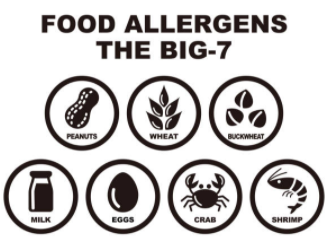Common Food Allergens in Japan and How to Spot Them

For anyone with allergies shopping for food (especially food with foreign packaging) can be difficult. We provide English translations for all the items we include in our Care Packages, but want to make sure that you are informed as possible as you continue to explore the vast world of Japanese cuisine.
The most common allergens to watch out for in Japanese food are:
- Fish and shellfish - can be found in broths and even pastries.
- Soy - An essential ingredient in soy sauce, you may also find soy in soups, marinades and sauces.
- Wheat - Found in the majority of Japanese noodles, gluten can also be found in soy sauce and grain teas such as mugicha (barley tea).

In Japan, the Ministry of Agriculture, Forestry, and Fishery (MAFF) has created a legal requirement that all food manufacturers must indicate the following seven foods if they are included as an ingredient:
- Buckwheat (蕎麦/そば)
- Crab (カニ)
- Egg (卵, たまご)
- Milk (乳)
- Peanuts (落花生/ピーナッツ)
- Shrimp (エビ)
- Wheat (小麦)
In addition to these seven ingredients, MAFF has also created a list of twenty ingredients that they recommend (not require) to be highlighted on product labels.
Here is a full list of the 27 allergens (the 7 required allergens are highlighted in red) commonly listed on Japanese foods:
|
ALLERGEN |
PRONOUNCIATION |
JAPANESE |
|
Abalone |
Awabi |
あわび、アワビ |
|
Apple |
Ringo |
りんご |
|
Banana |
Banana |
バナナ |
|
Beef |
Gyu-niku |
牛、牛肉 |
|
Buckwheat |
Soba |
蕎麦, そば、ソバ |
|
Cashew Nuts |
Kashu-natsu |
カシューナッツ |
|
Chicken |
Tori-niku |
鶏肉、鶏 |
|
Crab |
Kani |
カニ、蟹 |
|
Egg |
Tamago |
卵、たまご |
|
Gelatin |
Zera-chin |
ゼラチン |
|
Kiwi |
Kiwi-furutsu |
キウイ、キウイフルーツ |
|
Mackerel |
Saba |
さば、サバ |
|
Matsutake mushroom |
Matsutake |
松茸 |
|
Milk |
Nyu |
乳 |
|
Orange |
Orenji |
オレンジ |
|
Peach |
Momo |
もも、桃 |
|
Peanuts |
Rakkasei or pi-natsu |
落花生、ピーナッツ |
|
Pork |
Buta niku |
豚、豚肉 |
|
Salmon |
Sake |
鮭、さけ |
|
Salmon Roe |
iIura |
いくら |
|
Sesame |
Goma |
ごま、ゴマ |
|
Shrimp |
Ebi |
海老、エビ |
|
Soy |
Daizu |
大豆 |
|
Squid |
Ika |
いか、イカ |
|
Walnut |
Kurumi |
くるみ |
|
Wheat |
Komugi |
小麦 |
|
Yam |
Yama imo |
山芋、やまいも |
These allergens can sometimes be found listed on packages in a separate box and can be identified with the Japanese: "本製品のアレルギー物質" (Allergens in this product)
Learn more about how to read nutrition labels in Japan.
 Hi All! I am Miriam Weiss and am a mixed race Japanese/American passionate about promoting Japanese culture and all that it has to offer around the world. I grew up between Japan and California and was most recently living in Boston before moving to the Netherlands! I am excited to share my passion and knowledge with all of you!
Hi All! I am Miriam Weiss and am a mixed race Japanese/American passionate about promoting Japanese culture and all that it has to offer around the world. I grew up between Japan and California and was most recently living in Boston before moving to the Netherlands! I am excited to share my passion and knowledge with all of you!




19 comments
I noticed several people mentioned allergies to cashews and pistachios, but did not mention mangos. All three of are in the poison oak family (Anacardiaceae). Some people will react to the sap in the leaves, bark and fruit skins. So make sure to wash mangos in soapy water to remove the sap before removing the skin.
Hi Linda,
Thank you for your comment! As with traveling anywhere with allergies, it’s best to be prepared. It may make sense to carry a card that says “My son is severely allergic to cashew, pistachio, and hazelnut. I’m severely allergic to mint, spearmint, peppermint, and shiso leaf.” Which we have translated into Japanese for you as: 私の息子は重度のカシューナッツ, ピスタチオとヘーゼルナッツのアレルギーがあります。私は重度のミント、スペアミント、ペパーミント、シソ・大葉のアレルギーがあります。Enjoy your trip to Japan and let us know if we can be of help!
Hi Lauragh,
Thank you for your kind words and comment! As with traveling anywhere with allergies, it’s best to be prepared. It may make sense to carry a card that says “My son is allergic to hazelnut, walnut, pecan, cashew, pistachio and sesame.” which we have translated into Japanese for you as: 私の息子はヘーゼルナッツ, クルミ, ピーカン, カシューナッツ, ピスタチオと ごまにアレルギーがあります。Enjoy your trip to Japan and let us know if we can be of help!
Thank you for this valuable info! How would you write out: “My son is severely allergic to Cashew, Pistachio and Hazelnut.” Also (for myself), “I am severely allergic to Mint, spearmint, peppermint and shiso leaf.”
Hi Kokoro,
Thank you so much for your site. My son is allergic to, hazelnut, walnut, pecan, cashew, pistachio and sesame. Are you able to help me out to write this down in Japanese so I could show it to the restaurants?
Many thanks,
Lauragh
1